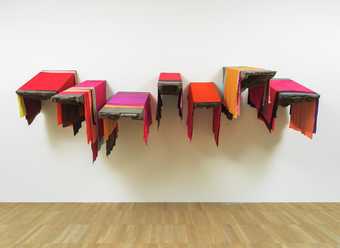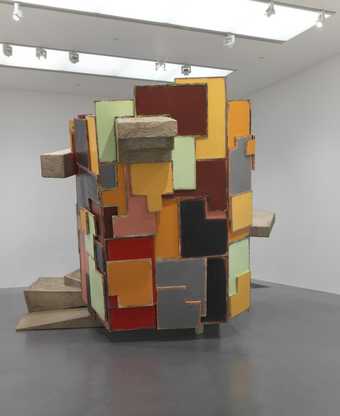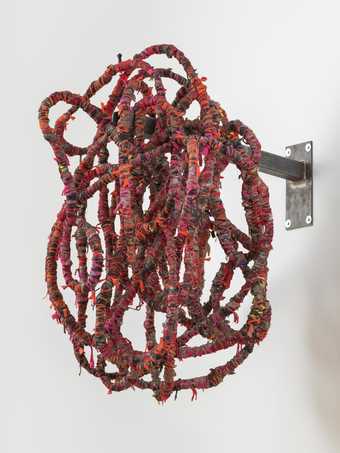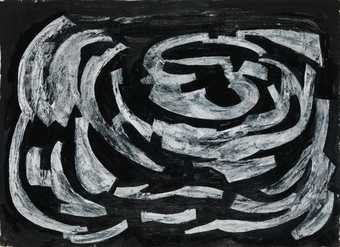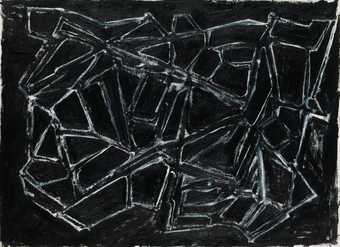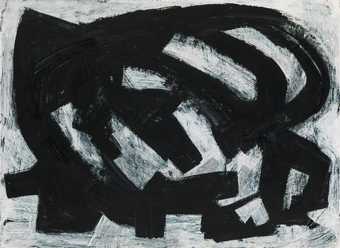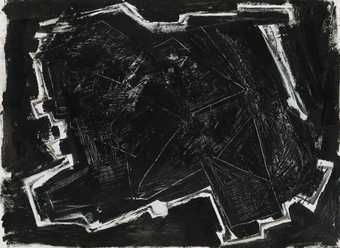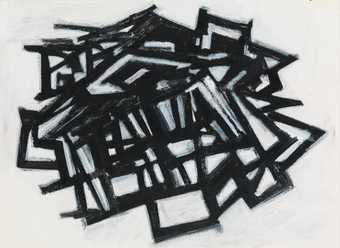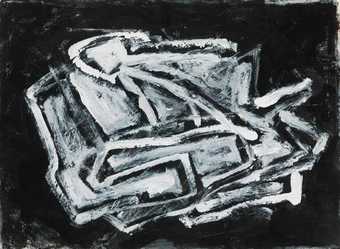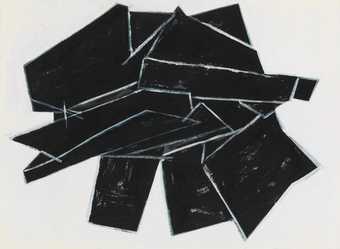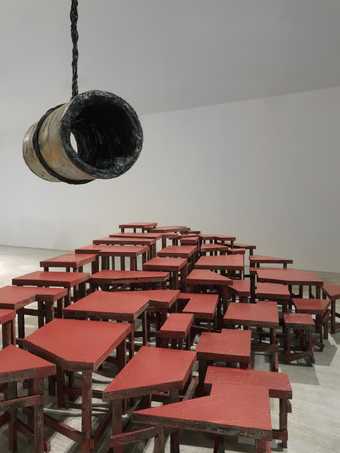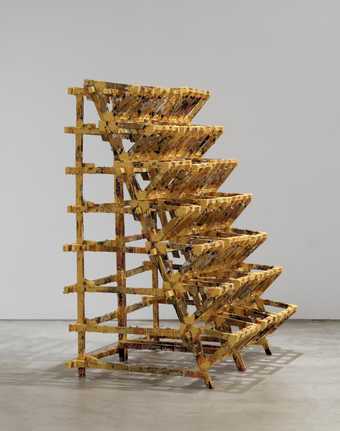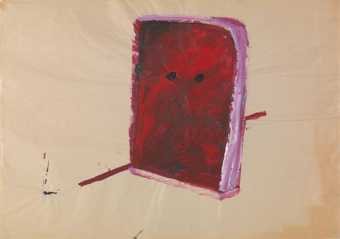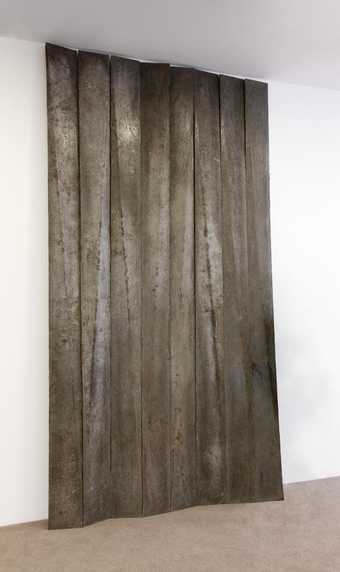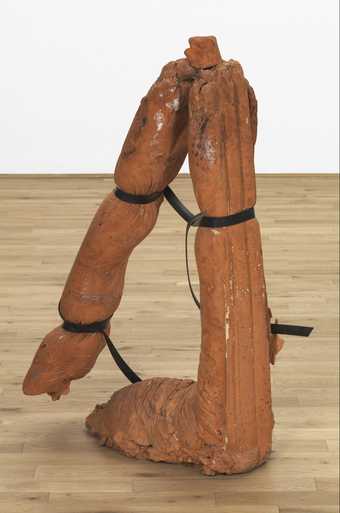Not on display
- Artist
- Michael Dean born 1977
- Medium
- Steel, paint, silicone resin, stones, shells and seaweed
- Dimensions
- Object: 1750 × 1435 × 695 mm
- Collection
- Tate
- Acquisition
- Purchased 2017
- Reference
- T14851
Summary
ffff (working title) is one of a group of sculptures made for the artist’s South London Gallery exhibition in 2016 and exhibited in his Turner Prize exhibition at Tate Britain later the same year. 4 shores 2016 (Tate T14849) and shored (Working Title) 2016 (Tate T14850) were also included in these exhibitions. Dean habitually works in series, creating a body of work around a particular word which he likes to wring out and explore until, for him, its meaning has been exhausted. The word that he focused on for his South London Gallery and Turner Prize exhibitions was ‘shore’, in both its literal meanings as the place where land and sea meet, and ‘to shore up’, to support or hold up, but also its colloquial abbreviation ‘sho’ or ‘sure’. The titles of all of the works, including any misspellings or inconsistent capitalisations, are as intended by the artist. ffff (working title) consists of a continuous piece of metal which is formed in such a way as to look like a piece of enlarged repetitive cursive script; it has then been covered in silicone and shells have been adhered to it. The shells are from industrial bags that can be bought for gardening or to place on driveways and, as such, reflect the artist’s interest in the relationship between nature and the urban environment. The title is an invented word that the artist uses as an expletive to express frustration or rage.
Dean is interested in the potential of words to be expressed in material form. Early in his career, the main component of his work was his writing, manifested as short texts, self-published books, sentences and dialogues, alongside small linguistic configurations of found objects and photography. Subsequently, his sculptures have become larger, using materials that are instantly recognisable from everyday life – concrete, steel, anti-vandal paint and corrugated iron. Dean produces these works by translating excerpts of his writing into a typeface of his own design, from which he then generates moulds and casts. The significant factor is not that the sculptures are decipherable as words, but rather that the viewer should be able to faintly discern language in their forms, with a word or an idea being just about imaginable. As such, the sculptures become instigators of individual engagement, as well as spaces through which to explore subjectivity in language and in art. Their human scale and at times oddly anthropomorphic aspect sets up a relationship with the body of the reader/viewer, and their own physicality in the exhibition space. Displayed in related groups and read in this way, Dean’s sculptures highlight the mediating position of language between an author/artist and the reader/viewer.
The industrial nature of Dean’s materials, combined with their anthropomorphic nature and scale, gives his objects the appearance of having been lifted from a building site, a docklands or an industrial estate. His work displays a heightened sensitivity to the physical properties of the materials used, playing with steel’s propensity to rust, the malleability and familiarity of corrugated sheet metal and, significantly, the porosity of concrete – a material that, even when set, can be stained by its environment, absorbing leaks and drips and the traces of human touch – endowing Dean’s work with an organic appearance that looks simultaneously manmade and naturally formed.
Further reading
Paul Teasdale, ‘Michael Dean: In Focus’, Frieze, no.143, November–December 2011, https://frieze.com/article/focus-michael-dean, accessed 1 November 2016.
Michael Dean, Lisa Le Feuvre, Pavel S. Pys, Michael Dean: Selected Writings, Milan 2012.
Laura Smith and Linsey Young, ‘Michael Dean’, in Turner Prize 2016, exhibition catalogue, Tate Britain, London 2016.
Linsey Young and Laura Smith
November 2016
Does this text contain inaccurate information or language that you feel we should improve or change? We would like to hear from you.
Explore
- abstraction(8,615)
-
- non-representational(6,161)
-
- irregular forms(2,007)
- text(1,043)
- universal concepts(6,387)
-
- decay(254)
- environment / nature(315)
- language(6)
You might like
-
Dame Phyllida Barlow DBE RA untitled: awnings, 2012
2012 -
Dame Phyllida Barlow DBE RA untitled: upturnedhouse2, 2012
2012 -
Dame Phyllida Barlow DBE RA untitled: torque, 2015
2015 -
Dame Phyllida Barlow DBE RA untitled: black 2, 2014/2015
2014–5 -
Dame Phyllida Barlow DBE RA untitled: black 3, 2014
2014 -
Dame Phyllida Barlow DBE RA untitled: black 4, 2014
2014 -
Dame Phyllida Barlow DBE RA untitled: black 7, 2015
2015 -
Dame Phyllida Barlow DBE RA untitled: black 9, 2015
2015 -
Dame Phyllida Barlow DBE RA untitled: black 10, 2015
2015 -
Dame Phyllida Barlow DBE RA untitled: black 11, 2014
2014 -
Dame Phyllida Barlow DBE RA untitled: brokenstage/hangingcontainer, 2012/2013
2012–3 -
Dame Phyllida Barlow DBE RA Untitled (Yellow Rack)
2006 -
Dame Phyllida Barlow DBE RA Untitled
1997 -
Michael Dean education (working title)
2012 -
Michael Dean shored (working title)
2016


